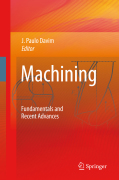
Machining is one of the most important manufacturing processes. Parts manufactured by others processes often require further operations before the product is ready for application. Machining processes can be applied to work metallic and non-metallic materials such as polymers, wood, ceramics and composites. Machining: Fundamentals and Recent Advances is divided into two parts. Part I explains the fundamentals of machining, with special emphasis on three importantaspects: mechanics of machining, tools, and work-piece integrity. Part II is dedicated to recent advances in machining, including: machining of hard materials, machining of metal matrix composites, drilling polymeric matrix composites, ecological machining (minimal quantity of lubrication), high-speed machining (sculptured surfaces), grinding technology and new grinding wheels, micro- and nano-machining, non-traditional machining processes, and intelligent machining (computational methods and optimization). Describes the fundamentals and recent advances in machining INDICE: Metal Cutting Mechanics, Finite Element Modelling.- Tools (Geometry and Material) and Tool Wear.- Workpiece Surface Integrity.- Machining of Hard Materials.- Machining of Particulate-reinforced Metal Matrix Composites.- Drilling Polymeric Matrix Composites.- Ecological Machining: Near Dry Machining.- Sculptured Surface Machining.- Grinding Technology and New Grinding Wheels.-Micro and Nanomachining.- Advanced (Non-traditional) Machining Processes.- Intelligent Machining: Computational Methods and Optimization.
- ISBN: 978-1-84800-212-8
- Editorial: Springer
- Encuadernacion: Cartoné
- Páginas: 361
- Fecha Publicación: 01/08/2008
- Nº Volúmenes: 1
- Idioma: Inglés
